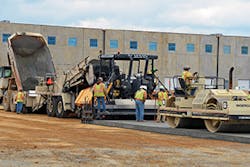Interstate 81 stretches for 855 miles along the Appalachian Mountains from the Canada/US border to Tennessee. The route is known as the trucker’s highway, a less congested North/South alternative to I-95 that carries more than 12% of the nation’s gross domestic product.
Hundreds of distribution warehouses and several major rail intermodals have sprouted along this heavily-trafficked corridor as Americans shift to online buying and demand shorter delivery times.
Don Smith, president of Hanover, PA-based contractor Conewago Enterprises Inc., eyed this commerce and construction trend more than a decade ago and introduced to the regional market an attractive paving option, roller compacted concrete (RCC), which would support the millions of pounds of freight hauled daily in and out of these logistical centers.
With a single backhoe loader, Smith’s father, Donald B. Smith, founded Conewago in 1956 as a general contracting service. Today, the second generation of the Smith family oversees a multi-faceted corporation with services spanning site and steel work to concrete and asphalt paving.
RCC is a mix of Portland cement, aggregate, and water that is classified as zero slump due to very low water content. RCC is applied with a conventional or high-density paver and the mix is tamped with vibratory steel or rubber-tire rollers after it is placed.
“About 15 years ago, we started experimenting with roller compacted concrete as an alternative to asphalt paving,” explains Smith. “At the time, oil prices were rising so we were searching for other material options and found RCC to be a very acceptable substitute product for the types of projects we were completing. The three main advantages of RCC are its cost-effectiveness, durability, and capability to span over the poor soil conditions we often encounter in the mid-Atlantic region.”
RCC is placed with less manual labor than conventional concrete. Because the application is similar to asphalt paving, it does not require forms as with standard poured concrete.
Depending on current asphalt and concrete indexes, the raw materials can be less expensive than asphalt. Coupled with material costs are the extended wear and minimal maintenance characteristics of RCC. RCC produces a rigid pavement versus asphalt, which is flexible, so RCC has the capacity to span over weaker soils to add strength. RCC typically outlasts asphalt with lifespans of more than 20 years.
Still, familiarity with RCC remains pocketed by industry. This was an early challenge Conewago met through a value engineering program to convert customers to the product.
“We use RCC with two types of clients,” says Smith. “The rail industry has recognized the benefits of RCC for many years and has come in as an educated client. The manufacturing and distribution industries are new to RCC so part of our process is to show the hard cost analysis and durability benefits.” Conewago has dedicated field liaisons who partner with potential customers to provide total cost of ownership statistics for RCC and prove its long-term value.
One such customer is Liberty Property Trust. Headquartered in Philadelphia, PA, Liberty is an $8.2 billion real estate investment trust that owns more than 105 million square feet of industrial and office space throughout the United States and the United Kingdom. In 2014, Conewago was tapped by Liberty for a new 1.7 million square foot, $93 million distribution center along I-81 in Shippensburg, PA, that included placing RCC on a 40-acre parking area. The building now stands as one of the largest commercial warehouses in the United States and one of the largest tilt-up concrete structures in the world. Over a four-month period,Conewago placed more than 45,000 cubic yards of RCC on the site.
Conewago is currently working on a second Liberty Trust distribution center site 30 miles down the road in Hagerstown, MD, where 9,000 cubic yards of RCC were recently placed.
“When we started placing RCC we used a standard asphalt paver with standard asphalt compactors. We quickly figured out that the European-style high-density pavers (such as the Volvo ABG models) with dual tamper bar compaction are the only way to put down RCC,” says Smith. These pavers also offer thicker lifts, up to 12 inches with the Volvo ABG.
Conewago currently uses a high-density Volvo ABG7820C paver with a variable width screed that extends up to 30 feet. The wider screed coupled with the vibratory double tamping bar means Conewago can place material faster while achieving compaction normally completed by large compactors. The added paving width also eliminates the number of joints, which in turn reduces long-term maintenance needs.
RCC quality comes down to density, explains Bill Heape, vice president of site development for Conewago. “The industry standard is 98% and what we are seeing with the Volvo paver is the ability to hit 90–95% right out of the paver so we are getting a higher strength and that reduces the amount of rolling needed to reach that 98% target. The double tamper bar on the screed strikes off the RCC material and gives it a smooth surface, but it also allows for that additional compaction effort.”
The variable speed tamper bar also allows the operator to adjust the compaction rate accordingly to avoid over- or under-beating the material.
The ABG paver is mated with a Topcon Millimeter GPS grading control system which together optimizes smoothness to counter one of the common drawbacks of RCC—its reputation for a rougher ride at higher speeds over 40 mph.
“When we were looking for a larger paver, we compared Volvo and its competition. Our crew had familiarity with ABG and they loved the smooth operation and high-quality finish they produce. And, it has the durability of a Volvo,” says Smith.
Conewago was supported in this decision by their local Volvo Construction Equipment dealer, Highway Equipment & Supply Co., located in nearby Harrisburg. Says Smith, “As far back as I can remember we dealt with Highway Equipment. They were a big part of my father’s success and they are always there when we need them. It was great to have them involved with this paver purchase as well.” Conewago demoed the ABG7820C paver before opting to buy the paver.
Conewago has the advantage of owning two portable plants for greater quality control of the mix. RCC is a cold mix application so moisture, rather than heat, is the critical factor. Conewago runs a field test lab literally behind the paver to instantly check the material as it is being placed. Operators can radio back to the plant to adjust the water balance to ensure the highest quality mix.
“Every location is going to have a different type of aggregate. We have found that rounded stone seems to provide a better RCC mix because it acts like roller bearings as you pave,” says Bill.
Temperature is still an issue. RCC industry standards follow similar rules for asphalt, preferably 40°F and rising. Like conventional concrete, the surface must be kept moist for seven days, or until a curing compound is applied. In colder temperatures, heating blankets or plastic sheeting is used to help cure.
RCC’s resilience and cost benefits have gained interest from the Pennsylvania Department of Transportation (PennDOT).
Conewago is participating in a PennDOT pilot program to test RCC and traditional asphalt for a section of residential roadway in Adams County. In this case, Conewago used RCC as a road subbase with asphalt overlay. This was the first municipal RCC project with funding provided through PennDOT’s liquid fuels fund. PennDOT will monitor the road over the next three years to gauge how it withstands traffic and weather, while many Midwestern states already use RCC as a subbase for road paving.
“We are one of the very few contractors who offers porous RCC pavement. It’s relatively new and we have found much better performance from the product when using a compacting paver. We have placed it on areas with light truck and car traffic and had good success,” says Smith.
While asphalt indexes are dropping in tandem with oil prices, Smith foresees that RCC has the stay factor. “We expect the demand for RCC to grow exponentially as more distribution customers see the total value of RCC and as oil costs start to rise again.”
Conewago Enterprises is an active member of the Pennsylvania Aggregates and Concrete Association (PACA) and the National RCC Council.



